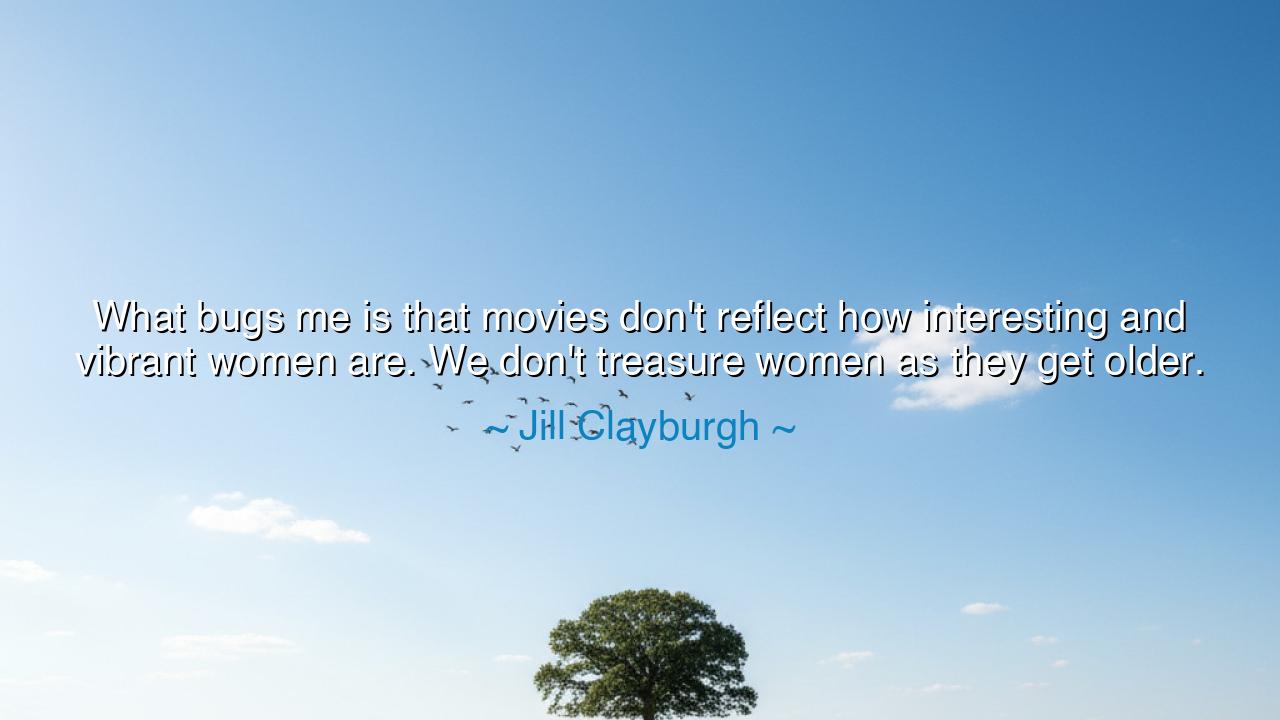
What bugs me is that movies don't reflect how interesting and
What bugs me is that movies don't reflect how interesting and vibrant women are. We don't treasure women as they get older.






The words of Jill Clayburgh, “What bugs me is that movies don't reflect how interesting and vibrant women are. We don't treasure women as they get older,” carry the weight of lament and the fire of truth. They speak not only of art, but of a culture that turns its gaze away from the fullness of womanhood. In this cry lies an ancient injustice—the blindness of a society that celebrates youth but neglects wisdom, that exalts beauty but overlooks endurance, that reveres beginnings yet forgets the sacredness of continuance.
The origin of such thought can be traced to the very myths and stories humanity tells. From the tales of Helen of Troy, who is remembered for her youthful beauty, to the goddesses of Olympus, frozen in eternal youth, the world has long enshrined women in images of fleeting radiance. Yet seldom are the voices of older women lifted, though they carry the vibrant force of survival, of love tested by time, of truths carved into their souls by hardship and triumph alike. The art of storytelling, which should reveal the fullness of life, too often silences this richness.
Consider the story of Sophia Loren, who, even in her later years, carried herself with grace, wit, and irresistible energy. Yet, despite her enduring brilliance, the roles offered her grew fewer, as though the world wished to forget the glow of age in favor of the sparkle of youth. Her struggle mirrored that of countless others—actresses, writers, mothers, teachers—whose value to the world only deepens with the years, yet whose contributions are too often cast aside in favor of fresher faces.
Clayburgh’s words are not simply complaint; they are a call to reverence. To treasure women as they get older is to honor the reservoirs of wisdom they carry, the vibrant spirit that does not fade but evolves. For in every line etched upon the face, in every gray hair, in every story told and every silence held, there lies a testimony of endurance and grace. To overlook this is to rob society of its own heritage, to sever ourselves from the strength of those who have walked before us.
The movies, as a mirror of culture, must rise to this challenge. Let them no longer show women merely as fleeting blossoms, but as mighty oaks that weather storms, shelter generations, and stand strong across the decades. Let them reveal the richness of womanhood not as something that expires, but as something that deepens, matures, and grows more luminous with time.
Thus, future generations must remember: to treasure women is to treasure life itself. For the vibrant women who age before us are not fading—they are ripening, becoming the keepers of memory and the guardians of wisdom. To honor them is not only just, it is the very path to understanding the fullness of what it means to be human.






HHuy
This quote really highlights a significant problem in how women are portrayed in media. The invisibility of older women in film is a real issue, and it affects how society values them. How do we change this narrative? Can we expect the film industry to embrace this shift, or will it take larger cultural changes for older women to be seen and celebrated for the interesting, vibrant individuals they are?
HPNguyen Hong Phuc
The idea that women are undervalued as they age is unfortunately all too true in the film industry. But is this purely a Hollywood issue, or does it reflect broader societal attitudes about aging? What if movies started showing older women as complex, multi-dimensional characters? Could it help shift cultural perceptions of aging and femininity in a positive direction?
GDGold D.dragon
I completely agree with Clayburgh’s point. Older women are rarely depicted as vibrant and dynamic in movies, yet they often possess the richest life experiences and most interesting stories. Why is there such a lack of representation for older women in leading roles? Shouldn’t we be celebrating their diversity and complexity instead of erasing them from the narrative once they hit a certain age?
TNNam tran ngoc
Jill Clayburgh’s statement is a powerful critique of how women are often portrayed in media. It’s frustrating how the industry often diminishes the value of women as they age, reducing them to secondary roles or stereotypical characters. Why do we not treasure the wisdom and depth that older women bring to the table? Is it because society still prioritizes youth over experience, or is it simply an oversight by the entertainment industry?